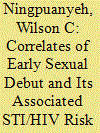| Srl | Item |
| 1 |
ID:
157197


|
|
|
|
|
| Summary/Abstract |
This study explores the correlates of early sexual debut and risk factors of sexually transmitted infections (STIs) among the youth in Malawi. Data was obtained from the Malawi Demographic Health Survey 2010. Out of a sample of 2987 males and 9559 females aged 15–24 years, 1405 males and 5217 females were considered. Chi-square and multivariate analysis was performed and findings presented by gender. The results indicate that females aged 15–19 years (OR=4.18), who were Muslims (OR=1.42), with no education (OR=3.99), were significantly more likely to initiate sexual debut early. Meanwhile, males aged 15–19 years (OR=3.50), from the northern region (OR=2.35) and of the Chewa ethnic group (OR=1.45) were significantly more likely to initiate sexual debut early. Muslims males (OR=0.57), from the poorest (OR=0.69) households were significantly less likely to initiate sexual debut early. Females who initiate sex earlier form a distinct risk group in this study. Specific intervention is therefore needed for young females in their early teen years before they initiate sexual debut.
|
|
|
|
|
|
|
|
|
|
|
|
|
|
|
|
| 2 |
ID:
153104


|
|
|
|
|
| Summary/Abstract |
This study examines the risk associated with inconsistent use of condoms as a risk factor for human immunodeficiency virus/sexually transmitted infections (HIV/STIs) and sexual risk behaviours. The Malawi Demographic Health Survey 2010 data were used. Out of a sample of 2987 males and 9559 females aged 15–24 years, 511 males and 675 females were filtered in the present study. A Chi square test and logistic regression techniques were performed. About 147(28.7%) males and 240(35.6%) females reported inconsistent condom use. The likelihood of inconsistent condom use was higher among females with secondary/higher education (odds ratio’s (OR)=1.46), with more than one partner (OR=4.27), and married males (OR=8.76), with more than one sex partner (OR=1.78).There is a need to raise condom use awareness and improve sexual education about consistent condom use, especially among females, in order to curb the spread of HIV/STIs and reduce sexual risk behaviours.
|
|
|
|
|
|
|
|
|
|
|
|
|
|
|
|